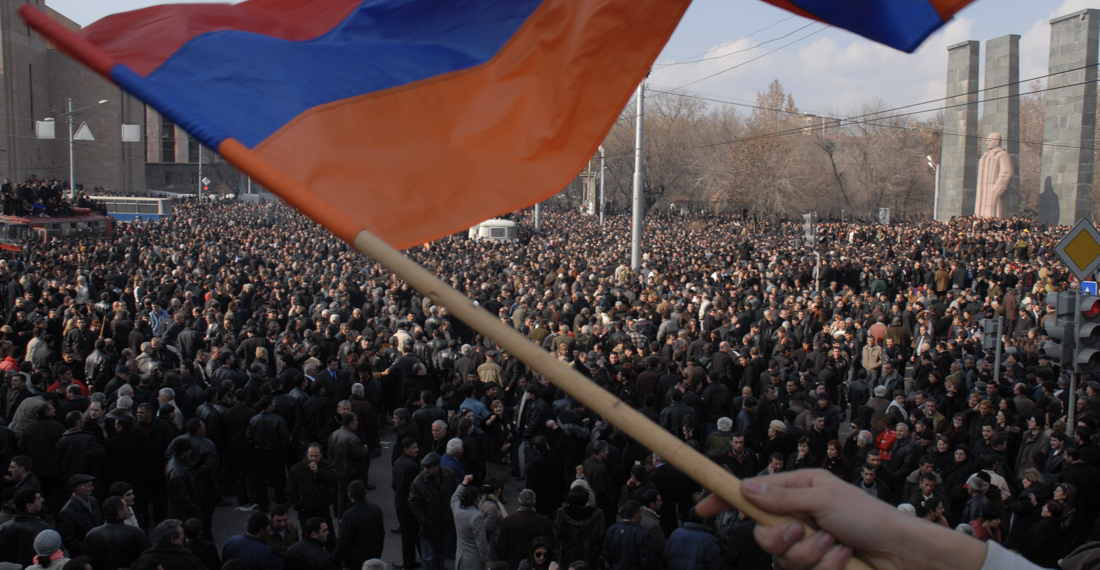After over a month of harsh and inflammatory rhetoric directed against the Armenian Apostolic Church, and especially its head, Catholicos Karekin II, Prime Minister Nikol Pashinyan late last month declared a ceasefire in the escalating war of words. The truce ostensibly took effect on at the very beginning of this month and will last until the end of the week when it will be assessed.
Pashinyan’s critics, however, did not take the initiative seriously. With dozens already arrested and facing deprivation of their assets and positions, they believe the damage has already been done. Opposition media also noted that the armistice was only offered after Pashinyan had one of his posts, laced with insults and even obscenities, removed by Facebook for violating community standards.
The opposition certainly seems unimpressed. “There will be no escape, no ceasefire, Nikol,” wrote Levon Zurabyan, deputy head of the Armenian National Congress (ANC) on Facebook.
For those looking in from outside, recent developments have been bewildering. In reality, there has hardly been a culture of civilised political discussion in recent history. The situation, however, has certainly worsened under Pashinyan though that is not to solely single out the government here. The opposition is as much to blame, especially following Armenia’s defeat by Azerbaijan in the 2020 war.
But with elections on the horizon, and Armenians used to leaders ruling for a maximum of two terms in office, an already tense situation risks worsening. Not only is Pashinyan seeking a quick resolution of Armenia’s disputes with Azerbaijan and Türkiye but not one leader has been re-elected to a third term in office before him. The previous political system made that impossible.
Now, under a fully parliamentary system where the prime minister is voted for by the National Assembly and not the electorate, that is not the case. The 2015 constitution, after all, was introduced under Serzh Sargsyan to extend his own rule by seizing the premiership after his second and final presidential term ended in 2018. Only Pashinyan’s ascendency on the streets prevented that.
Since then, the country has faced constant challenges in translating that into meaningful democratic reform. The West says otherwise, but many Armenians would disagree. If anything, the first real test of Armenia’s democratic credentials will come next year. Parliamentary votes held in 2018 and 2021 were arguably held under duress – first following the Pashinyan-led protests and then the war.
In both cases, the opposition was in disarray and too tainted by the past while the electorate was first incapacitated by euphoria and then by an uncertain future.
For now, it is quite likely that Pashinyan’s Civil Contract party could gather more seats than the opposition at the party level, but it is less certain whether they will be sufficient to indirectly re-elect Pashinyan without the support of other parties in the National Assembly. Fortunately for his Pashinyan, even if his ratings are perilously close to single digits now, the opposition remains even lower.
Of concern, however, is Pashinyan’s tendency to increasingly rely on more authoritarian methods to maintain power and eradicate any opposition. True, his supporters might well argue that only a form of managed democracy can offer a viable way forwards at this stage but some charge that this could effectively lead to the creation of a one-party system instead.
Ironically, a leader once hailed as the embodiment of democratic reform now faces mounting criticism for bypassing democratic norms, eroding institutions and alienating broad segments of society. His only trump card, perhaps, is pushing for peace even if that perspective only came after defeat and arguably not before it.
There is no doubt that peace is necessary. If Armenia is to break free from its dependency on Russia and diversify instead, it is vital. The European Union knows this only too well. Indeed, Brussels appears willing to overlook Pashinyan’s idiosyncrasies and shortcomings to further its own strategic goals in the region, banishing Moscow in the process.
It must be a tempting proposition. However, trust in the prime minister is fragile and that weakness is already showing. Much of the population is apathetic or disenchanted with any option while political polarisation among those that are engaged has reached an all-time high though that is not to say there can be some unanimity at times.
According to a survey released last week by local pollster MPG, 57.9 percent of respondents reportedly said they were fully opposed to Pashinyan’s targeting of the Catholicos with a further 19.2 percent somewhat against. Even if there is much wrong with the church and its leadership, instead of building consensus, Pashinyan tends to instead enflame skepticism and mistrust.
Though the EU will support him to the hilt for the 2026 vote, and already has its European Political Community (EPC) Summit scheduled for Yerevan just before the elections, there are also 11 months left for further divisive actions to destabilise the situation further. The loudest emboldened voices are already less interested in governing than removing Pashinyan – whatever the cost.
Ironically, that also appears to be his own objective for retaining the premiership. For all sides, the end justifies the means. In that context, peace agreements, geopolitical diversification, open borders, and regional transit corridors will not matter as much as the need for social cohesion.
The EU faces a test. If it is serious about supporting democratic development in Armenia, it must also stress the need for genuine political dialogue, civil discourse, and a truly pluralistic but professional media. It must also resist the urge to pick favourites when convenient. Pashinyan called for an end to the acrimonious tit-for-tat bickering. In no uncertain terms, the EU should too.
source: Onnik James Krikorian is a journalist, photojournalist, and consultant from the U.K. who has covered the Armenia-Azerbaijan conflict since 1994. Photo: Protest Demonstration, Yerevan, Armenia © Onnik James Krikorian 2008
The views expressed in opinion pieces and commentaries do not necessarily reflect the position of commonspace.eu or its partners.






